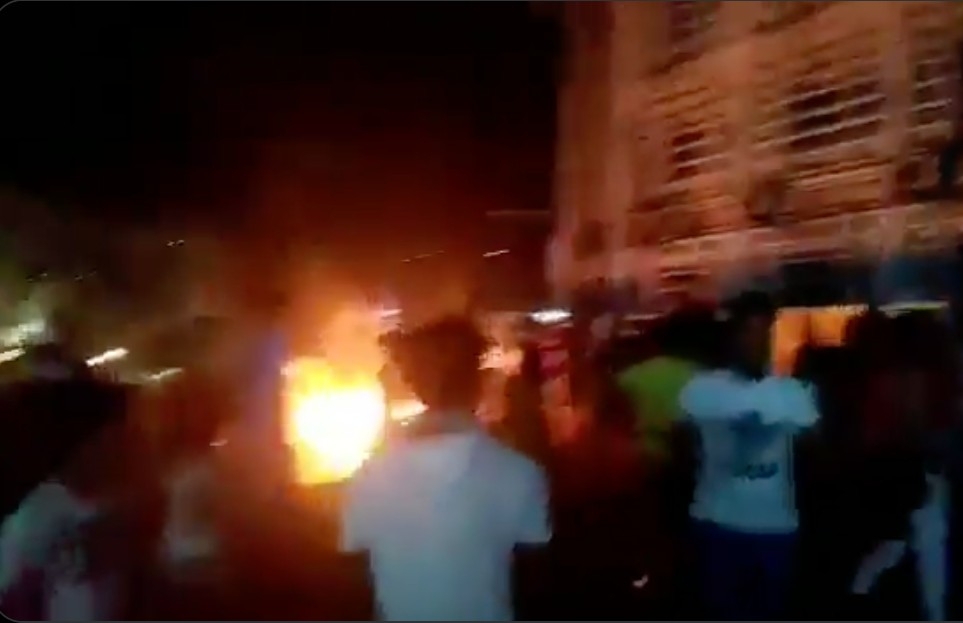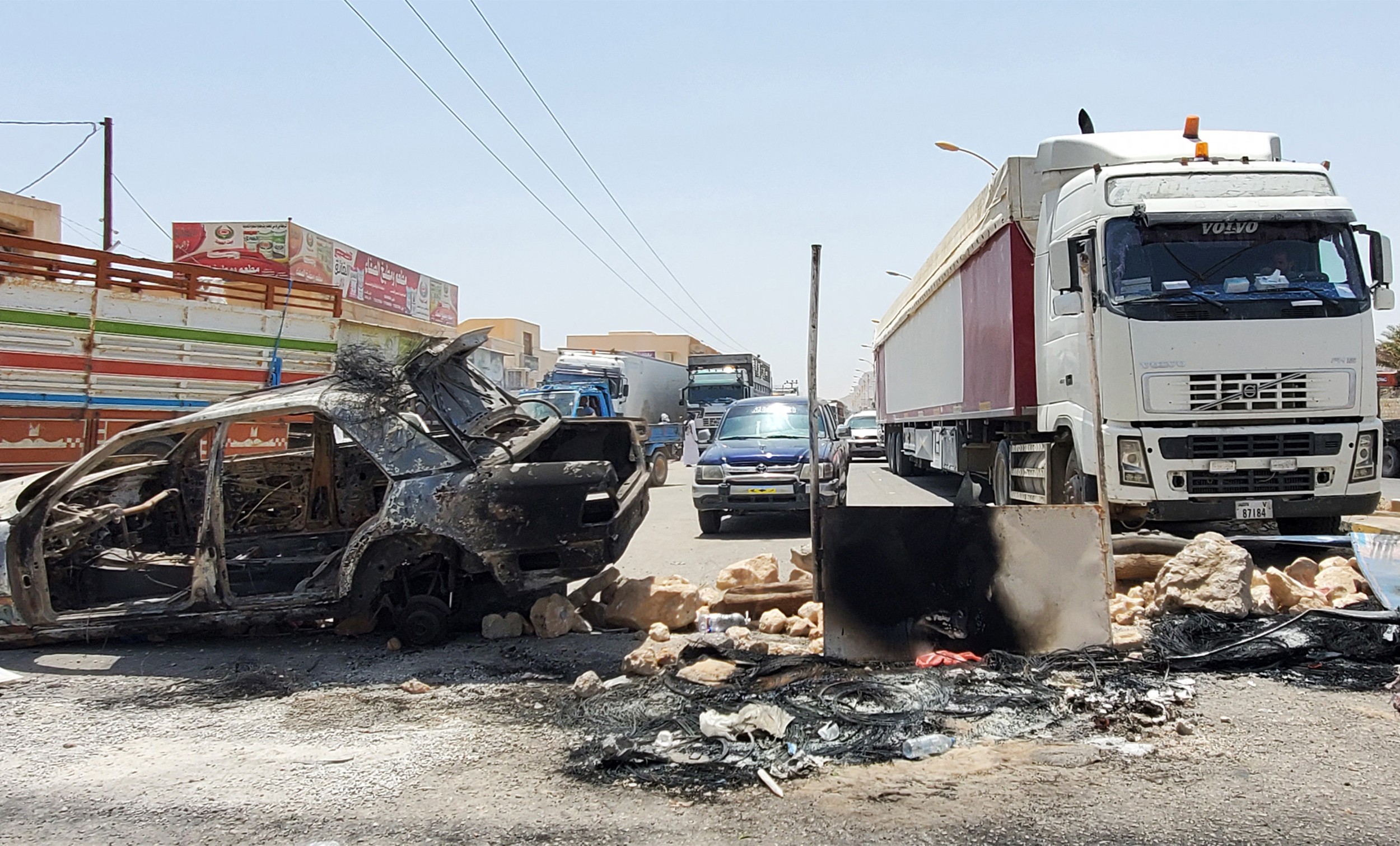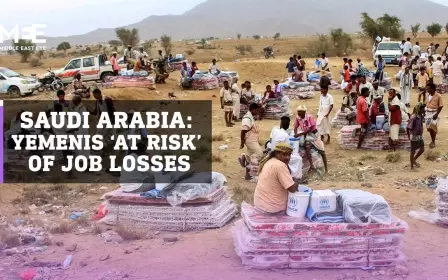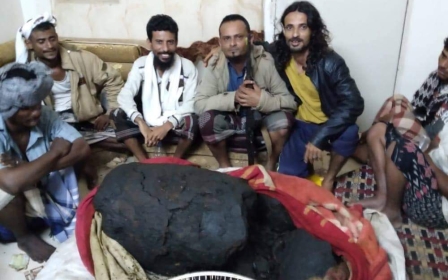South Yemen rocked by protests as rial plummets and food prices soar

Southern Yemen has witnessed five days of uproar, killings and arrests, with authorities failing to subdue widespread protests despite declaring a state of emergency.
Hundreds of people flooded the streets in the southern cities on Thursday night and into Friday morning, demanding basic services and the steadying of Yemen’s rial.
'No one can stop us from demanding our rights. The population is now in the streets and it is hunger that forced us to do this'
- Ammar Thabit, protester
The Yemeni currency has collapsed to more than 1,120 to the US dollar in the country's southern provinces, making food prices prohibitively expensive for many in a nation where 80 percent of the population are reliant on aid. In 2015, the rial stood at around 215 to the dollar.
The port city of Aden is under the control of the UAE-backed Southern Transitional Council (STC), a body that has previously fought and campaigned for an independent South Yemen. Hadhramaut and Shabwah, meanwhile, are held by the internationally recognised government.
Both administrations are supporting the upheaval in each other’s territory, issuing statements of support on social media for protesters facing off against their rival.
New MEE newsletter: Jerusalem Dispatch
Sign up to get the latest insights and analysis on Israel-Palestine, alongside Turkey Unpacked and other MEE newsletters
The demonstrations have already turned deadly. STC forces have killed two protesters in Aden: one on Tuesday while dispersing a crowd and another on Wednesday.
Meanwhile, pro-government forces have killed two in Hadhramaut over the past week, most recently on Thursday night while protesters in the al-Shihr district demanded the release of people arrested during the protests.
Security forces in Hadhramaut announced a curfew on Thursday in an attempt to quieten demonstrations, which are mostly taking place at night due to the intense September heat. But the measure failed to keep the protesters indoors that night.
With unrest continuing to roil, Hadhramaut authorities have said schools will be closed all of next week.
Hunger and anger
Ammar Thabit is a teacher in Aden, struggling to feed his family as food prices rise daily. He now takes part in the protests, raging about the insecurity that the spiraling currency and his $60 per month salary brings.
“No one can stop us from demanding our rights. The population is now in the streets and it is hunger that forced us to do this,” he told Middle East Eye.
“Both the STC and the government are behind our suffering. They only care about their interests, leaving people to starve to death. Not one of them found a solution to this economic disaster.”
Thabit rejected accusations that political forces lay behind the protests, pointing out that they are found under rival administrations. The protests will continue until their demands are met, he insisted.
“Both sides are killers of civilians. We took to the streets peacefully and the STC killed us in Aden while the government forces killed our brothers in Hadhramaut,” Thabit added. “We demand our rights, and we will win against the oppressive regime.”
The father of five admitted his family’s situation could be a lot worse. Some have nothing to eat at all, he said.
“The number of people who take to the streets is increasing every day because people don’t have anything to lose. They decided to go to the street and even if they will be killed or detained - they don’t care.”
Much like the curfew, protesters have not been dissuaded by the arrests and shootings.
And the unrest has drawn international concern. On Thursday, the ambassadors of Saudi Arabia, the United Arab Emirates, the UK and the US held a press conference in Riyadh and expressed concern over the deteriorating economic situation.
They called for immediate steps to ensure economic stability in Yemen, adding the Riyadh-based Yemeni government’s return to Aden is imperative.
Political exploitation
Despite both the STC and government being under pressure, the rivals have taken the protests as an opportunity for scoring points against each other.
Mukhtar al-Rahbi, an adviser to the information minister, has been raising tensions online by criticising the STC’s response.
“The STC militias carried out a campaign of kidnappings that affected dozens of people from Aden participating in the blessed Aden uprising,” he tweeted on Friday.
“Dozens of military crews of the STC militias belonging to the province of al-Dhalea and Lahj kidnapped dozens of activists in Crater, Sheikh Othman, Dar Saad and other parts of Aden province.”
'We don’t support any political side, but I can see that political sides are exploiting the protests for their own interests'
- Aref Baobaid, protester
STC officials have been doing the same. Summer Ahmed, a representative of the southern secessionists, tweeted: “Despite the repression and terror that the demonstrators were subjected to in Shabwah, they came out and demanded the expulsion of the occupying Muslim Brotherhood militias, and demanded the return of the [UAE-backed] Shabwani Elite forces.”
Aref Baobaid, a Hadhramaut resident, joined protests in al-Shihr.
“We don’t support any political side, but I can see that political sides are exploiting the protests for their own interests,” he told MEE.
“We take to the streets against them both, they keep exploiting everything, even our suffering.”
Baobaid said most people don’t think about political issues, they only care about basic services and food. “I’m now 54-years old and I haven’t seen an economic crisis like this one. Rich people turned into poor ones, looking only for food. This isn’t Hadhramaut that I know,” he told MEE.
Hadhramaut is one of the wealthiest provinces in poverty-struck Yemen, according to economic reports. It produces oil and its coastline has a rich fishing industry.
“Even those who aren’t poor people take to the streets demanding services like electricity, and they are against the high prices,” Baobaid said.
Middle East Eye delivers independent and unrivalled coverage and analysis of the Middle East, North Africa and beyond. To learn more about republishing this content and the associated fees, please fill out this form. More about MEE can be found here.






